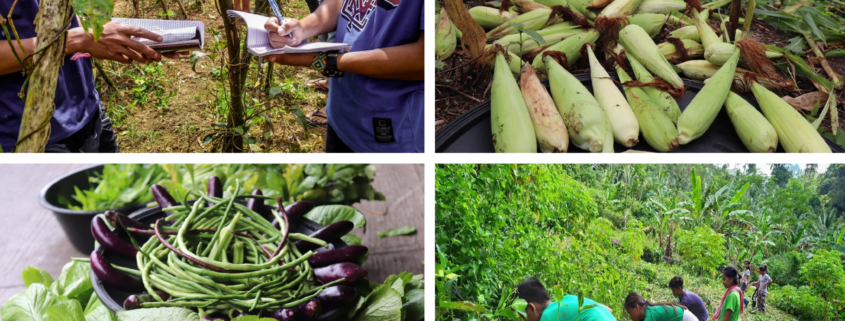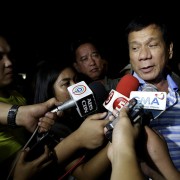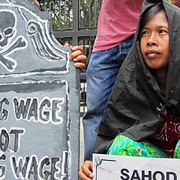Fighting for our rights to food, a healthy environment and development
In a forum on the role of consumers in agroecology, Commission on Human Rights (CHR) Economic Social and Cultural Rights (ESCR) Center Assistant Chief Klarise Espinosa stressed that the right to food is recognized in the International Covenant on Economic, Social and Cultural Rights (ICESCR).
Article 11 states that “everyone has a right to an adequate standard of living… including adequate food, clothing and housing, and to the continuous improvement of living conditions.” As duty bearers, governments are expected to make sure that the right to food and the factors enabling it are realized, clarified Espinosa. The ESCR Center is currently reviewing to what extent the Philippine government facilitates and provides sustainable, available, and accessible food.
The ICESCR underscores that the right to food is linked to having decent living standards and the availability of essential needs, services and utilities for an individual and families. For campaigners of People Economics, asserting the right to food is inextricably connected to the people’s struggle to realize their rights to produce food and other basic needs, to industrialization, to a nurtured environment, to the comprehensive range of working people’s rights, to progressive fiscal systems, and to economic sovereignty.
Right to food challenged
In the Philippines, the government gives only token attention to the right to food, as well to the rights to an adequate standard of living, services such as health and education, and even to utilities such as water and electricity. Neoliberal policies have also kept the economy backward and underdeveloped, thus leaving the environment in bad shape, and affecting the availability of safe and sufficient food.
The Philippine government’s food threshold is very low and set at a measly Php50 per person per day. But the Philippines should not have to be counted among the top countries with moderate to severe food insecurity and high levels of malnutrition as per the food and Agriculture Organization (FAO) had the government not abandoned and liberalized agriculture, IBON Research Head Rosario Guzman said.
The critical state of our natural food sources, namely Philippine agriculture and the environment, is due to government neglect and mispriorities. This helps to explain why Filipinos’ access to safe and sufficient food is problematic.
The agriculture sector, which produces our food, lost 1.4 million jobs from 2017 to 2019, or even before the pandemic. The sector’s annual growth was only at 2.1% on average in the same period and its share in the economy has reached its smallest in Philippine history at 7.8% of gross domestic product (GDP) in 2019. Combined agriculture and agrarian reform budgets were at their lowest in 21 years being only 3.6% on the average also from 2017-2019.
In the middle of the pandemic, government even defunded agriculture further with a meager 1.5% allocation in the 2021 budget. This pales in comparison with the agriculture budgets of rice-exporters Vietnam, Thailand, and Indonesia, which are at 6.3%, 3.6%, and 3.3% of their national budgets, respectively.
Land degradation and land use conversion have also disrupted the ecological balance and affected food systems.
The country’s forest cover is now down to only 23.3% of the country’s land area which, according to environment scientists, is ecologically unhealthy. They say that the country’s geography and terrain should sustain a 54% forest cover.
The use of inorganic chemicals and input-dependent crop varieties meanwhile has caused severe erosion in 70.5% of the country’s land area. Moreover, land conversion for corporate agriculture, cash crops, real estate and infrastructure has also added to ecological disruption. The current administration is for instance pushing for almost one million hectares of oil palm plantations in Mindanao. Its Build, Build, Build infrastructure projects, including the Kaliwa, Kanan, and Laiban Dams, threaten to destroy communities, livelihoods, farms, forests, and water sources.

Hunger and government’s unsustainable ways
Philippine agriculture is in contradiction as a food system, affirms Dr. Charito Medina of the Magsasaka at Siyentipiko para sa Pag-unlad ng Agrikultura (MASIPAG). Farmers and fisherfolk producing food, he says, struggle to eat, and are the poorest sectors with 36% and 34% poverty incidence, respectively, according to official 2018 poverty statistics. Land planted to food kills instead of extending life because it is heavily infused with chemicals. Agricultural lands produce not for people but for big business in the case of feeds and biofuels production. Food wastage is high. Ultimately, corporations, not farmers, control and profit from agriculture. Government policies even prioritize importation and cash crops for export instead of strengthening local food production.
Rural, urban, and indigenous folk affirm how government policies have made food more difficult to both produce and avail. Zen Soriano of the Amihan National Federation of Peasant Women (Amihan) said that during COVID, farming communities are practically being hamletted during the lockdown. This makes it difficult for farmers to transport their produce and for farmworkers to transfer from one planting area to another. There are even cases when peasant missions to deliver food aid were terrorist-tagged. She also said that the rice liberalization law has caused palay prices to fall and millers to close down.
Mimi Doringo of the urban poor group Kalipunan ng Damayang Mahihirap (Kadamay) meanwhile said that for families whose breadwinners lost their jobs or are in precarious work amid the coronavirus crisis, more expensive food and services make it more difficult to cope. Kakay Tolentino of the BAI Indigenous Women’s Network agreed that many government policies have interfered with indigenous people’s food systems in ancestral lands, from the commercialization of palay seeds to destructive mining, export crop plantations, ecotourism projects, and militarization.
These are happening while the pandemic crisis batters especially millions of the poorest and informal workers. The widespread distress is driving calls for heightened aid, food security programs benefiting all marginalized sectors, junking rice liberalization, and a halt to corporate landgrabbing and the commercialization of land and crops. Strategically, the calls are for land reform so that tillers can make their land productive and benefit from this, and for a healthy and robust environment that is not being maimed in pursuit of so-called development that only benefits a few.
Call to consumers
As rights holders, consumers can establish solidarity with producers and themselves begin sustainable practices in producing and consuming food. They can demand the production of and access to safe and sufficient food. Consumers need to also thwart the corporate onslaught on agriculture. Consumers can assert not only the right to food but the right to produce it, and other economic, social and cultural rights.
Solidarity with producers can range from forming relationships to directly procure local farmers’ produce and help raise farmers’ incomes, to standing with farmers in their campaigns for land and life. While maintaining this connection with local producers, consumers can also engage in urban farming to grow what they eat and eat what they grow.
In demanding the production of and access to safe and sufficient food, consumers can call out government neglect of the country’s own production sectors. They can push for ample budget allocation to agriculture and industry, free land distribution and stopping land use conversion, and boosting local production by giving farmers financial and infrastructure support. They can push government to procure local produce and to ensure local stocks for adequate supply.
Consumers can demand that the price of food be reasonable. They can demand subsidies in times of crises and emergencies such as during the COVID-19 pandemic. There are so many households, displaced workers, farms and small businesses in need.
The corporate onslaught on agriculture and on Filipino producers and consumers also has to be thwarted for local production systems to break free from big business and foreign profit-driven objectives. This means saying no not only to the highly chemical and artificial farm inputs detrimental to the soil and the people’s health, but also to all policies that prevent Philippine agriculture from flourishing into the nation’s giver of food and material for development. This means saying yes to Filipinos’ indigenous, traditional ways of farming, while improving food and agricultural programs towards being ecologically sound, scientific and sustainable conduits of progress. #
* “The Role of Consumers in Agroecology” was co-organized by the Samahan at Ugnayan ng mga Konsyumer para sa Ikauunlad ng Bayan (SUKI), Magsasaka at Siyentipiko para sa Pag-unlad ng Agrikultura (MASIPAG), IBON, and the AgroecologyX Network







